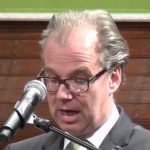 John Gilhooly, Künstlerischer Leiter der Londoner Wigmore Hall und Vorsitzender der Royal Philharmonic Society, erhält den mit 10 000 Euro dotierten Musikpreis des „Heidelberger Frühling“ 2019. Der „Heidelberger Frühling“ vergibt die Auszeichnung jährlich an Persönlichkeiten, die sich substanziell und nachhaltig für die Vermittlung von klassischer Musik einsetzen.
John Gilhooly, Künstlerischer Leiter der Londoner Wigmore Hall und Vorsitzender der Royal Philharmonic Society, erhält den mit 10 000 Euro dotierten Musikpreis des „Heidelberger Frühling“ 2019. Der „Heidelberger Frühling“ vergibt die Auszeichnung jährlich an Persönlichkeiten, die sich substanziell und nachhaltig für die Vermittlung von klassischer Musik einsetzen.
Die Begründung der Jury für die Preisvergabe:
Seit John Gilhoolys Amtsantritt an der Wigmore Hall im Jahr 2005 – mit 33 Jahren war er der jüngste Leiter eines international so renommierten Konzertsaals – hat er sie zu einem der weltweit führenden Orte für Kammermusik, Gesang und Musikvermittlung entwickelt.
Heute ist ein Auftritt in diesem „Tempel für Kammermusik“ zu einem unverzichtbaren Markenzeichen in den Biographien junger Sänger und Instrumentalisten geworden. Dank John Gilhoolys kluger, anspruchsvoller und risikofreudiger Programmgestaltung sowie beispielhaften Musikvermittlungsformaten öffnet die Wigmore Hall einem breiten Publikum die Tür zur klassischen Musik. Hier trifft das kundige Kernpublikum auf den neugierigen Ersthörer, Klassikeinsteiger von heute werden zu Kennern von morgen. Es gelingt John Gilhooly, über das Nebeneinander ein Miteinander zu kreieren; für Künstler wie Publikum hat er in London eine Heimat für musikalische Inspiration mit starker Bindungskraft geschaffen.
Dieser Anspruch und sein unermüdlicher Einsatz insbesondere für das Lied und das Streichquartett verbindet John Gilhooly elementar mit dem künstlerischen und gesellschaftlichen Auftrag, dem sich auch der Heidelberger Frühling verbunden und verpflichtet fühlt. Für seine herausragenden Leistungen wird John Gilhooly mit dem Musikpreis des „Heidelberger Frühling“ ausgezeichnet …
Wofür sich der Preisträger bedankt:
„Der „Heidelberger Frühling“ ist für mich seit langem ein herausragendes Beispiel für ein innovatives Festival. Ich fühle mich geehrt, den Musikpreis des „Heidelberger Frühling“ 2019 zu erhalten. Das damit verbundene Preisgeld werde ich an die Wigmore Hall und die Royal Philharmonic Society spenden, als Anerkennung für all die wunderbaren Menschen, die mit diesen beiden Musikinstitutionen verbunden sind.
Ich freue mich darauf, 2019 noch mehrfach nach Heidelberg zurückzukehren“.
Der in seiner Form einzigartige Preis wird von HeidelbergCement gestiftet.
Das Unternehmen ist Gründungspartner des „Heidelberger Frühling“ und dem Festival seit 1997 als Hauptförderer verbunden.
Frühere Preisträger sind der Klarinettist und Komponist Jörg Widmann, die Musikjournalistin Eleonore Büning, der Pianist und Kulturmanager Markus Hinterhäuser, der Bariton Christian Gerhaher, Klaus Lauer, ehemaliger Intendant der Badenweiler Musiktage, und die Pianistin Gabriela Montero.
Die öffentlichen Preisverleihung fand am Sonntag 7. April um 16 Uhr im Palais Prinz Carl statt. Musikalisch gestaltet wurde die Verleihung von Pianist Igor Levit und dem spanischen Cosmos Quartet.
Der Intendant des „Heidelberger Frühling“ Thorsten Schmidt hielt die
– in lupenreinem englisch gehaltene – Laudatio:
„Dear John Gilhooly, dear audience,

 This year’s Music Prize of the Heidelberger Frühling festival goes to a representative of the Guild of Directors. It is the first time that I give the laudatory speech for the prizewinner myself. There is a reason for this.
This year’s Music Prize of the Heidelberger Frühling festival goes to a representative of the Guild of Directors. It is the first time that I give the laudatory speech for the prizewinner myself. There is a reason for this.
I can hardly think of a colleague about whose work I feel as strongly related with as John Gilhooly‘s work. The focus and the priorities of the work at Wigmore Hall and the Heidelberger Frühling festival are very similar. I absolutely admire John Gilhooly’s work at Wigmore Hall in London. His work is inspiring and exemplary on many different levels.
How to approach John Gilhooly’s work and achievements in this laudatory speech? Let’s start with a look at the facts: 500 concerts per year, with 200.000 tickets sold annually. If you count all items in its diary, Wigmore Hall stages close to 1000 events every single year. Just looking at it from a quantitative point of view and in comparison to the size of the hall, this is unparalleled anywhere in the world. And the list goes on: 40 commissions per year enable the constant dynamic development of our cultural heritage. With „Wigmore Hall live“, John Gilhooly reaches 40 million people all over the world by broadcasting more than 100 concerts. In addition, two international competitions – for song and string quartet – and ingeniously conceived music education programs. That alone is an impressive achievement. But this enumeration is not enough to get to the bottom of John Gilhooly’s achievement as an artistic director.
Another way to pay tribute could be to point out his work with audiences or his achievements in building and providing a unique platform for young artists. Performing at Wigmore Hall is a knightly and sought-after accolade. But that, too, is only part of the story. All these are visible results.
What is really special about our prizewinner’s work can be found and explained on a different level. It is the general attitude of a man who in 2005, at the age of only 32, became the world’s youngest director of a concert hall and has since developed it into one of the most important centres for chamber music and song worldwide.
What makes John Gilhooly’s work and attitude so special? Let’s try to find the answer to this question through the job description of an artistic director. Journalist Eleonore Büning, in her eulogy for Markus Hinterhäuser – one of the former prizewinners -, distinguished between Artistic Directors and Managing Directors. I would like to start at this point and develop the idea further.
The director of a concert hall or festival who does not combine the will to generate sustainable artistic impulses with a focus on audience development, fundraising and marketing will not be successful in the long run. All artists I know are – in their capacity as artistic directors – outstanding managers. And likewise, there is not a single colleague who is not characterized by the unconditional desire to present outstanding programs.
John Gilhooly is an ideal example of the combination of artistic creativity with daring and outstanding management skills that have one big purpose: to make Wigmore Hall a musical home for artists and the public alike.
For him, creating enthusiasm is the best possible way to achieve this. This enthusiasm must always go hand in hand with the highest level of professionalism – on an artistic level as well as with everything that happens backstage for the artists and the audience. He sees it as his duty to create an excellent environment that makes great music possible. Or, to use John Gilhooly’s words: personal relationships with artists are the key to creating great concerts. His artistic programming strives to be as diverse and colourful as the society we’re living in. This conviction is inherent in his unconditional will to mediate between artists and audiences.
John Gilhooly’s goal is to create an audience that encourages an artist and therefore enables an outstanding performance. Artist, programme and audience are the three main themes he knows how to deal with wisely. The special thing about it is how he does it: uncompromisingly. Any artist has to be suitable with the hall, it’s about trust. A lunch with artists can tell him a lot about whether someone is suitable or not. That sounds trivial. But it’s not. It’s essential. John Gilhooly is uncompromising. Artists who are not suitable are not invited to perform in the hall. This is not only to protect the audience, but also to protect the artists. Bowing to trends is not John Gilhooly’s way. Illuminating an artist’s personality, thinking about an artist’s possibilities and putting together the right programs, especially for young artists, is what Wigmore Hall and John Gilhooly stand for. No wonder that many outstanding artists have been invited to at Wigmore Hall very early on. One could also call John Gilhooly a treasure hunter in this sense.
When Igor Levit plays at today’s awards ceremony, it’s of course no coincidence. Being supported by John Gilhooly was a stroke of luck for him too. And Igor Levit is part of the connection between Wigmore Hall and Heidelberger Frühling. John Gilhooly trusts his intuition once he has examined the matter carefully. And intuition cannot be learned, John Gilhooly is a natural talent. Conversations inspire him. Conversations lead to programs. On one hand, he is interested in the perfect individual program which is created in exchange and conversation. But all individual programmes have to fit into a bigger picture. And to define the pillars of this bigger picture is – as I understand it – the bridge to the audience. The audience should find a home just like the artists. It is relationship management in the true sense of the word that distinguishes John Gilhooly’s work from others. Between artists and audiences. All with the aim of reaching out to the audience and finding something new. To create a place without boundaries. A place that acts as an anchor in the hustle and bustle of London. A place that always invites you to discover music, to get involved in programmes and experience young, up-and-coming artists.
This is music education in the best sense of the word. Thank you, John. Congratulations“.
